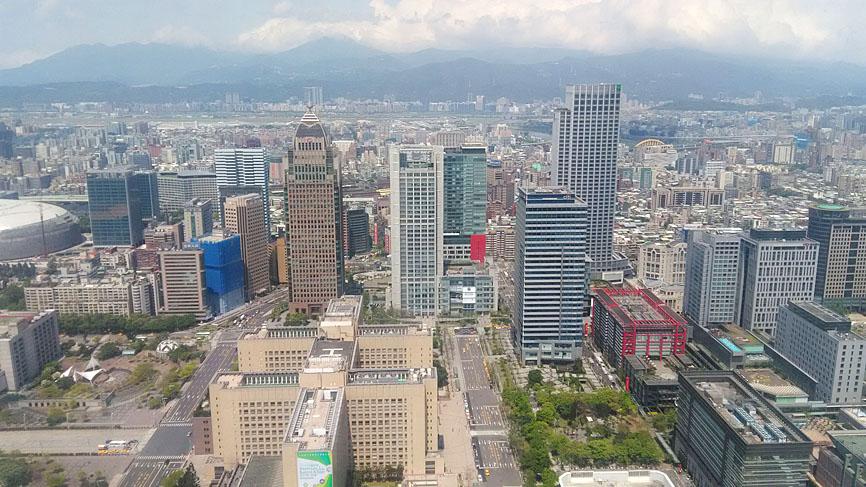Taiwan’s commercial property transactions more than doubled to US$2.6 billion last quarter, making it the sixth largest market in the Asia-Pacific region, Real Capital Analytics Inc (RCA) said in a report on Tuesday.
The increase in the nation came while the region saw a 38 percent decline during the same period, the report added.
The sale of a hotel in Taipei for nearly US$1 billion contributed largely to the upturn, the analyst said, adding that real-estate transactions in the industrial sector were strong on the back of robust trading.

Photo: CNA
Taiwan also climbed ahead of Singapore on the leaderboard of most active markets in the region, it said, adding that the first nine months of the year saw sales of US$3.9 billion.
“The escalation of trade tensions between China and the US has resulted in another wave of investment into manufacturing facilities across Asia. Taiwan was no exception, as industrial investment spiked last quarter to US$1.3 billion, a record high for a single quarter,” RCA senior analyst for Asia Pacific Benjamin Chow said.
Taiwan’s strong performance stands in stark contrast to the overall showing in the region where sales of commercial property fell 38 percent between July and September as the COVID-19 pandemic slowed cross-border deals, RCA said.
Income-producing property sales dropped to US$26 billion, down from US$33 billion in the previous quarter and US$42.2 billion a year earlier, it said.
Industrial sector activity matched the level of last year, but all other key property types in the region declined, with hotel and retail sales seeing the sharpest drop, the firm said.
Transactions involving individual properties increased from the second quarter to US$23 billion, boosted by a small amount of high-value deals, while portfolio sales fell to levels last seen during the 2008 global financial crisis, it said.
Sales of development sites, with a majority taking place in China, grew from a year earlier, with deal volume totaling US$162 billion, an 18 percent year-on-year increase, RCA said.
“The COVID-19 pandemic will continue to hamper deal-making for cross-border investors as economic uncertainty in many markets puts many of them on hold,” RCA managing director for Asia Pacific David Green-Morgan said.
Markets with robust domestic demand — such as South Korea, Japan and China — are holding up better in the current environment, Green-Morgan said.

NEW IDENTITY: Known for its software, India has expanded into hardware, with its semiconductor industry growing from US$38bn in 2023 to US$45bn to US$50bn India on Saturday inaugurated its first semiconductor assembly and test facility, a milestone in the government’s push to reduce dependence on foreign chipmakers and stake a claim in a sector dominated by China. Indian Prime Minister Narendra Modi opened US firm Micron Technology Inc’s semiconductor assembly, test and packaging unit in his home state of Gujarat, hailing the “dawn of a new era” for India’s technology ambitions. “When young Indians look back in the future, they will see this decade as the turning point in our tech future,” Modi told the event, which was broadcast on his YouTube channel. The plant would convert

‘SEISMIC SHIFT’: The researcher forecast there would be about 1.1 billion mobile shipments this year, down from 1.26 billion the prior year and erasing years of gains The global smartphone market is expected to contract 12.9 percent this year due to the unprecedented memorychip shortage, marking “a crisis like no other,” researcher International Data Corp (IDC) said. The new forecast, a dramatic revision down from earlier estimates, gives the latest accounting of the ongoing memory crunch that is affecting every corner of the electronics industry. The demand for advanced memory to power artificial intelligence (AI) tasks has drained global supply until well into next year and jeopardizes the business model of many smartphone makers. IDC forecast about 1.1 billion mobile shipments this year, down from 1.26 billion the prior

People stand in a Pokemon store in Tokyo on Thursday. One of the world highest-grossing franchises is celebrated its 30th anniversary yesterday.

Zimbabwe’s ban on raw lithium exports is forcing Chinese miners to rethink their strategy, speeding up plans to process the metal locally instead of shipping it to China’s vast rechargeable battery industry. The country is Africa’s largest lithium producer and has one of the world’s largest reserves, according to the US Geological Survey (USGS). Zimbabwe already banned the export of lithium ore in 2022 and last year announced it would halt exports of lithium concentrates from January next year. However, on Wednesday it imposed the ban with immediate effect, leaving unclear what the lithium mining sector would do in the